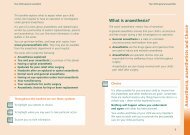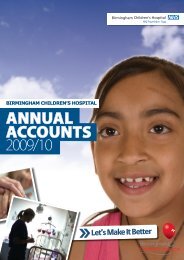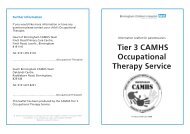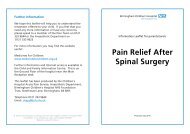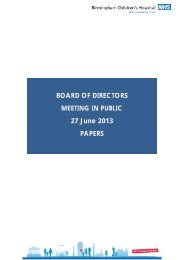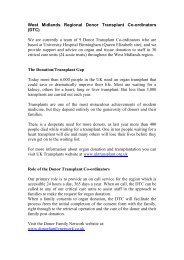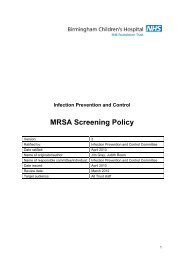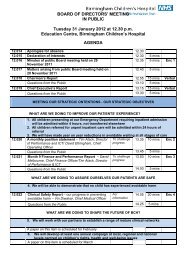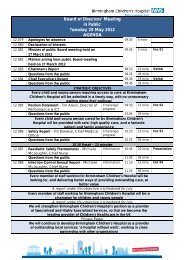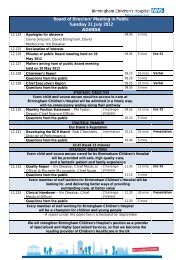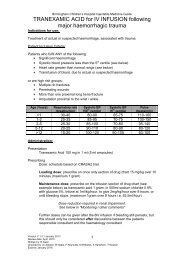Nurses Day! - Birmingham Children's Hospital
Nurses Day! - Birmingham Children's Hospital
Nurses Day! - Birmingham Children's Hospital
You also want an ePaper? Increase the reach of your titles
YUMPU automatically turns print PDFs into web optimized ePapers that Google loves.
BACK TO CONTENTS PAGE<br />
Overview of Quality of Care<br />
Complaints<br />
We take all complaints about our services very<br />
seriously and ensure that the way we respond is<br />
tailored to the individual and that we answer all<br />
of their concerns. Our Chief Executive is involved<br />
in every response and writes personally to each<br />
individual. Responding to a complaint can include<br />
meetings with clinical staff and senior managers,<br />
including the Chief Executive.<br />
Formal complaints often originate in a concern<br />
raised with PALS (Patient Advice and Liaison<br />
Service) which supports families in obtaining the<br />
response they need in the best way for them. We<br />
encourage people to use our Formal Complaints<br />
service and PALS as, if something has gone wrong<br />
we want to know about it so we can try to put it<br />
right, learn from it and improve. This information,<br />
when combined with other quality information about<br />
our services, can also help us identify when there<br />
are other problems.<br />
Fortunately, compared to the numbers of patients<br />
we see every day, we receive very few formal<br />
complaints. Each one is considered in detail and<br />
incorporated into our Safety Dashboard and our<br />
Quality Report.<br />
Figure 28: Numbers of formal complaints per month/per 1,000 admissions<br />
(This data is governed by local definitions)<br />
15<br />
10<br />
5<br />
0<br />
J F M A M J J A S O N D J F M A M J J A S O N D J F M<br />
2011<br />
Complaints<br />
Complaints per 1000 Admissions<br />
2012<br />
2013<br />
As part of the formal complaints investigation<br />
process, we identify any areas in which the quality<br />
of the services could be improved, and make<br />
appropriate recommendations. These range from<br />
reminders to staff about proper practices and<br />
behaviour, to fundamental changes in practice and<br />
documentation. We regularly follow up on these<br />
recommendations to make sure action has been<br />
taken.<br />
As a result of these recommendations a number of<br />
changes have been made, including:<br />
l Radiology: An area has been identified where families can discuss issues privately.<br />
l Surgical <strong>Day</strong> Care: To avoid any discrepancy in recording weight and therefore incorrect<br />
calculation of medication, the same member of staff who checks a child’s weight now also<br />
writes the weight on the drug chart.<br />
l Communication processes between Radiology and Rheumatology secretaries about<br />
appointments have been improved.<br />
l All wards: The handover process has been improved to ensure speciality patients on outlying<br />
wards are more clearly identified.<br />
l All clinical areas: A new discharge form has been designed to prevent failure to follow-up.<br />
l The Breast-feeding training programme has been re-launched.<br />
l Learning Disabilities: increased awareness has been raised amongst staff about the<br />
importance of the Trust Learning Disabilities Passport and care pathways.<br />
l The experience of a family will be used as a learning example for doctors in training.<br />
l Heart Investigation Unit: A test results tracking process has been introduced.<br />
Figure 29: Pattern of complaints per top 5 categories, 2010/11 - 2012/13 admissions<br />
(This data is governed by local definitions)<br />
30<br />
25<br />
20<br />
15<br />
10<br />
5<br />
0<br />
Q4 Q1 Q2 Q3 Q4 Q1 Q2 Q3 Q4<br />
2011<br />
2012<br />
2013<br />
Waiting, delays & cancellations<br />
Staff Attitude<br />
Quality of Treatment<br />
Communication<br />
Other<br />
In order to see whether there are any themes<br />
amongst the complaints we receive, we group the<br />
issues raised in each complaint into categories.<br />
The pattern of complaints received about the 5<br />
main categories is set out above.<br />
In January 2013 the Patient Association published<br />
a report: Complaint handling in NHS Trusts<br />
signed up to the CARE campaign, which is based<br />
on information about the complaint handling<br />
systems and processes of a random sample of<br />
trusts. <strong>Birmingham</strong> Children’s <strong>Hospital</strong> was one<br />
of the randomly selected trusts and is included<br />
anonymously within the report. The Patients<br />
Association wrote to us and gave us some<br />
positive feedback about what they have seen of<br />
our systems and processes, in particular they<br />
said: “<strong>Birmingham</strong> Children’s <strong>Hospital</strong> appears<br />
committed to being a learning organisation.<br />
An example of this is your unique approach of<br />
measuring complaints against Trust values within<br />
the Quality Report”.<br />
Incidents<br />
We have robust systems for managing incidents<br />
and in 2011/12 were awarded NHSLA level 3, the<br />
highest level for compliance with the NHS Litigation<br />
Authority Risk Management Standards. In 2012 we<br />
128 129<br />
carried out a ‘Lean’ process on our investigation<br />
management system to ensure it is as efficient<br />
as it can be. This means investigations can now<br />
be concluded more quickly, which is better for the<br />
patients and families involved and allows us to start<br />
implementing learning from the incident earlier than<br />
we previously could.<br />
In 2013 our Internal Auditors gave an opinion<br />
of ‘significant assurance’ about our incident<br />
management processes.<br />
We encourage all members of staff to report all<br />
incidents, errors and near misses so we can<br />
make improvements, work out what went wrong,<br />
identify themes and drive quality improvements in<br />
everything we do. We share learning from incidents<br />
through our Safety Circular, a staff publication<br />
which provides news on safety issues and changes<br />
made as a result of incidents and incident analysis.<br />
Our Quality Report - which is published on our<br />
website - also includes information about incidents,<br />
which any member of staff or the public can read.



